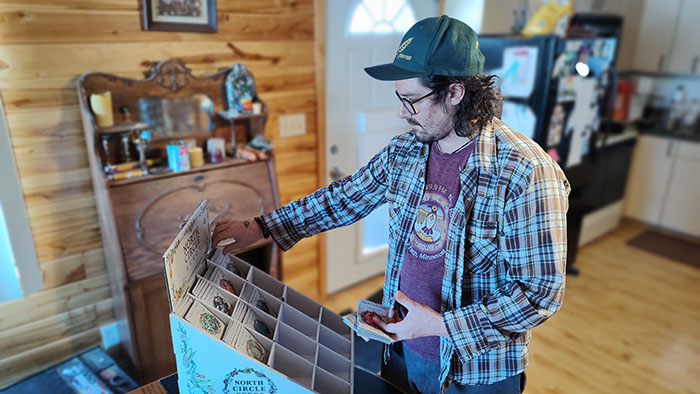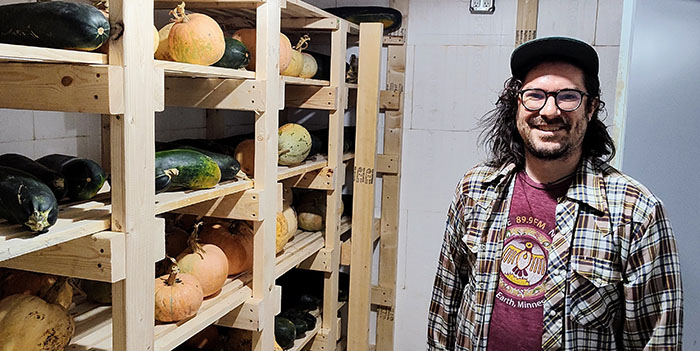Leaving Long Island for rural Vergas
News | Published on February 14, 2023 at 4:50pm EST | Author: frazeevergas
0Paige stewards organic seed around Minnesota

Zachary Paige loads up one of his seed displays that are dispersed throughout Minnesota at foot co-ops.
By Robert Williams
Editor
Zachary Paige left his home on Long Island, New York, packed up his car, and moved to Minnesota in pursuit of sustainable living in 2012. He now owns his own farm and seed company after working in the sustainable farming industry and finding his own niche.
“I came out in my Subaru Outback and wanted to learn more about sustainable farming and wanted to live a more sustainable lifestyle,” he said.

North Circle Seeds owner and Manna board president Zachary Paige stands in one of his new root cellars built on his Vergas farm thanks to a grant from the Ceres Foundation.
Paige began working with the White Earth Land Recovery Project, an organization that works to continue the revival of Indigenous lifeways and to protect native seeds, traditional foods, and knowledge of our Indigenous land-based communities.
Paige has continued to work with the White Earth community for the past decade.
Back home, Paige gained an interest in seed saving after working on a farm in Vermont.
“Not knowing much about farming and working on a sustainable farm I realized that farms don’t save their own seeds,” he said. “That sparked my curiosity. Why is that? How could I learn about that?”
That curiosity led him to a seed school for a week of training in Arizona at Native Seed Search.
“After doing that I got really inspired,” Paige said. “From that point on I kind of knew in the back of my head I was going to start a seed company someday.”
Paige went back to school at Iowa State University for plant breeding and got his Masters degree while completing a senior project on breeding for high nutrition quality in corn.
He continued to work with the White Earth community and began getting feedback from people in the industry.
“Year by year, just kind of learning a little bit more,” he said.
He began working closely with Minnesota farmers of the Sustainable Farming Association like Greg Reynolds, Kathy Connell, Dr. Sue Wika and Ryan Pesch of Lida Farm near Vergas. Both Pesch and Paige are members of the Manna Food Co-op in Detroit Lakes; Pesch is the treasurer and Paige the president.
“Doing this program through the Sustainable Farming Association in Minnesota called Sustainable Food Production was huge because I got to know a lot of people in Minnesota, learning about who is involved in seed saving,” said Paige.
A decade after moving to the Vergas area, Paige looks back at the guy behind the wheel of that Subaru with the pride of getting what he came for, even though he was unsure of exactly what that was going to be.
“I didn’t really have a thought-through plan,” he said. “The plan was generally to learn more skills and live sustainably, so I think I checked that box. I fell in love with the seed work so much it’s taken up a lot of my time.”
Working the farm
Paige runs his business on his farm in rural Vergas near Lake Franklin and built a new building on his property this year for seed storage with a root cellar. A $60,000 grant from the Ceres Foundation kickstarted the new building which will house an office and production area for seed packing and cleaning.
“I like to do things slow and steady, start small and build organically,” said Paige. “It’s been fast in the sense of like the first year I had 25 varieties, second year 50, third year 70 and this year I have 80. I’m tapering off a little but I think I’ll get up to something below 200.”
Paige uses two fields on 3 acres on his large property to grow flowers and vegetables to create the seeds in Otter Tail County.
“The thing that makes us special is that most companies don’t grow their own seed in the area that they’re located,” said Paige. “They’ll have seed contractors around the country and the world. A lot of these places that look homesteady and even have that feel to it – it’s not really, like Seed Savers in Iowa. It’s not all coming from Iowa. The bigger it is, the more outsourced it is.”
Paige networks at seed conferences with like-minded and styled farms and seed producers and distributors from around the country.
“We’re all doing it where we are,” he said. “We all know and support each other. It’s a small world. There are only a few hundred of us doing it like that.”
There is no base science for how to successfully grow for seed production. Every variety has its own rules.
“When you’re taking on a new species…what do I know about bitter melon? It’s a different species that I haven’t done before, but is related to other cucurbits like squash and cucumbers,” said Paige. “It has its own little quirks that you have to know and the different families have different rules.”
While discovering those quirks, Paige uses knowledge gained from similar species. For instance, cucumbers are best harvested for seed after the fruit is mature.
“You wait until it’s almost white because you know the seeds are mature in it and that is similar for squash, also,” he said. “Then tomatoes, the seed is fully mature when the tomato is fully mature so letting it go longer isn’t really necessary.”
On the other end of the spectrum, planting lettuce produces seed in the early stages of growing.
“Once you learn those, you know how much you can use for food, too,” said Paige. “You use as much of the squash and tomato for canning or other personal use so you’re not wasting the fruit. Sometimes, you have to do that, like with something that goes to seed at the very end—like lettuce.”
There are biennial plants that seed in two years like kale, cabbage or carrot, beat and onion.
“The first year you’re growing the carrot or onion,” said Paige.
The root cellar allows for those plants to be stored over the winter in a climate-controlled environment to keep them thriving so the next year he can replant to get seeds.
“The reason for that too, and not to just leave it in the ground, part of the process is to select the best ones,” he said. “All of those traits are going into the genetics for next year. You’re saving the biggest ones, the ones that taste the best.”
Harvest specifics and particulars for his variety of nearly 100 products create multiple timelines during the year and Paige and his team harvest by hand to maximize the output.
“On one hand it’s hard because it’s more labor and time, but on the other hand, we’re more productive because we’re able to do it the right days when it is harvestable without using million-dollar equipment,” he said. We can go through and deadhead and take all the seeds and then go back again and again. It takes a little more time but you get four times as much seed. It pays off.”
A grant from Lakeland Co-op allowed Paige to package and distribute his product to more than a dozen co-ops around Minnesota, including Manna in Detroit Lakes. He continues to also sell his seeds online at his website Northcircleseeds.com.
For Paige, the lifestyle outweighs profits. He began his quest leaving the east coast looking for a different way to live and that is still the top priority.
“I don’t think anybody does this for the money,” he said.
The short term future for North Circle Seeds is finishing the building on the property with space to continue educating others.
“Just like that seed school that inspired me,” he said. “I’ve been doing those throughout the past 10 years, talks, presentations and one to two-day workshops, but I think eventually I’d like to do a 3-5 day and host it here.”
Adding housing on his property will allow for immersive weeklong classes that allow students to go through the entire process from harvest to cleaning, threshing, packaging and storing.
“I see it as a piece of the sustainability movement where there aren’t a ton of people doing it,” said Paige. “I want to share the knowledge and experience I’ve gained while hearing everyone else’s experience.”
Paige plans to hopefully begin 1-day classes this coming May and branch out from there.
Visit northcircleseeds.com for a ton of more information on organic seeds and his seed shop. Purchase North Circle Seeds at Manna Food Co-op on Washington Avenue in downtown Detroit Lakes.

